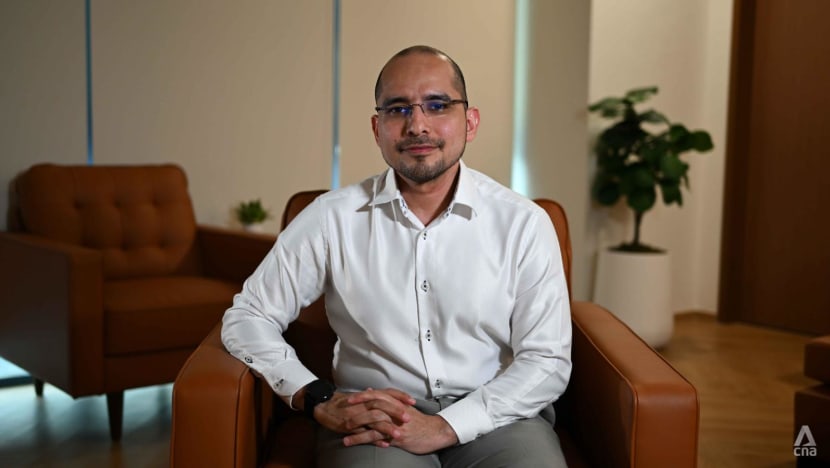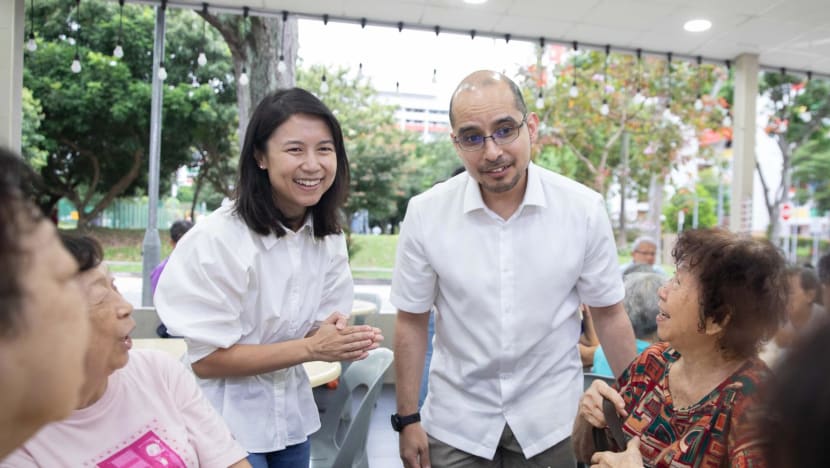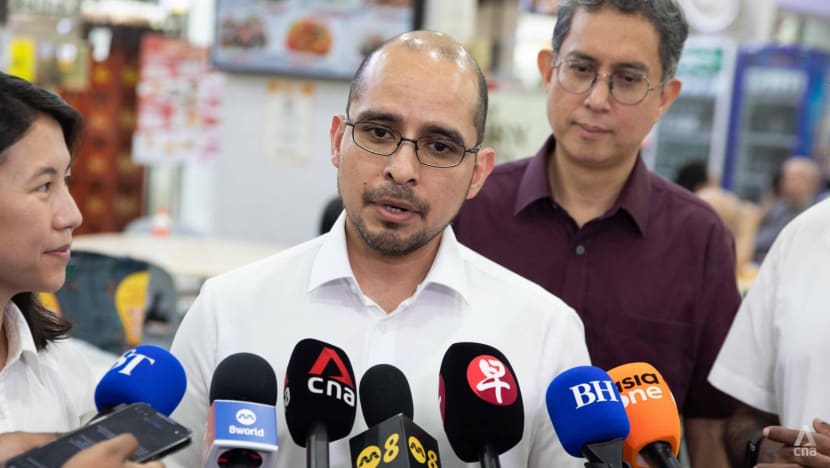GE2025: I was 'absolutely' independent as an NMP, joining politics was last thing on my mind, says Syed Harun
The former NMP says he resigned and joined a political party to "serve Singapore and Singaporeans at a deeper level".

Dr Syed Harun Alhabsyi at the Starfish Clinic on Apr 14, 2025. (Photo: CNA/Lim Li Ting)

This audio is generated by an AI tool.
SINGAPORE: Former Nominated Member of Parliament (NMP) Syed Harun Alhabsyi said on Monday (Apr 14) that he was "absolutely" independent while he was in parliament and joining a political party was the "last thing" on his mind when he first took on the role.
Together with fellow NMP Raj Joshua Thomas, Dr Syed Harun resigned from his post on Feb 14 before the end of their terms, which was seen as a controversial move.
“I gave my best as an NMP when I spoke in parliament, I wrote every speech myself, I meant every word that I said, and the points really came from my heart in wanting to improve things for Singapore and Singaporeans,” said Dr Syed Harun, in his first extended media interview since his resignation.
He has been spotted walking the ground in Nee Soon Group Representation Constituency (GRC) since the end of March. Last Friday (Apr 11), he told reporters that he is a potential candidate for the People’s Action Party (PAP) in the upcoming General Election.
He and former senior civil servant Goh Hanyan are both likely to be fielded in the constituency, which is helmed by Home Affairs and Law Minister K Shanmugam.
The consultant psychiatrist pointed out that during his NMP term, there were times he had challenged the government in its position on certain issues and "nudged it to consider things differently".
From his appointment in July 2023 to his resignation in February, he had filed five adjournment motions on diverse issues.
These ranged from foreign policy to mental healthcare, one on creating opportunities for youths to thrive, another on social cohesion and the last in February was for taking a whole-of-society approach to addressing discrimination.
“In fact, even with the minister I now support on the ground in Nee Soon, I disagreed and expressed some reservations with Minister Shanmugam on one of the Bills tabled by MHA (Ministry of Home Affairs),” he said.
"Specifically, it was in relation to the sentence for enhanced public protection, but subsequently, with the arguments that were put forward, I was a bit more reassured after some safeguards were explained.
“So in that sense, as far as the independence of myself as an NMP is concerned, I spoke my mind and where I felt it was fit, I was always ready to be able to give a different point of view.”
When asked, he did not say when he was approached to join the PAP.
Asked if he felt that would conflict with his NMP role, he said he decided to resign once he began seriously considering going into politics.
“After my resignation, I took it upon myself to understand the PAP better, to understand what it stood for, the work it was doing on the ground, before taking the decision to join the party,” he said.
CNA also asked how he would respond to criticism of his move.
“My resignation as an NMP to join a political party, really at its core, was to serve Singapore and Singaporeans at a deeper level, and to give more of myself to the community and to the country, and not less,” he said.
A medical doctor and psychiatrist, Dr Syed Harun graduated from the Yong Loo Lin School of Medicine at the National University of Singapore, where he was the president of the NUS Muslim Society.
After decades of working in the public sector, the first and only Malay-Muslim psychiatrist in Singapore now runs his own clinic - The Starfish Clinic of Psychiatry & Mental Wellness.
An active volunteer since his teens, he began volunteering with a children’s home while in school. The 40-year-old studied at Raffles Institution and Victoria Junior College.
Since then, his leadership appointments at charitable and public organisations have outnumbered his professional titles, including at the Islamic Religious Council of Singapore (MUIS), the Films Consultative Panel, National Youth Council, Singapore Psychiatric Association, and Muslim Healthcare Professionals Association.
He is also president of Lembaga Biasiswa Kenangan Maulud or LBKM, a charity that provides financial aid to students and vice chair of the review committee for welfare homes under the Ministry of Social and Family Development.
On his community work, Dr Syed Harun said that it has been “eclectic”.
“It was very instructive and formative for me to be able to realise in my teenage years of the many blessings and privileges I had … the ability to have an intact family, the ability to be able to go to school and not worry about your fees as well as your bus fares,” said Dr Syed Harun, who grew up in an HDB flat around Bedok Reservoir.
"I do think that in giving back to community … your own blessings don’t diminish, in fact, you only flourish," he added.

When asked why he has decided to join politics now, he said: “It is really just an extension of who I’ve been and my own life ethos in terms of wanting to serve.”
Since making up his mind to join the PAP, he has been active in Nee Soon, doing house visits, walkabouts and getting to know the residents better, he said.
He emphasised the last point, saying that each case and each resident’s circumstances are unique.
“My own approach … has always been to listen first,” he said.
"In that sense, it is similar to the work I’ve been doing all this while. This is something I do in my clinical practice as a psychiatrist. This is something that I do as a volunteer," he added.
Dr Syed Harun said he would continue to champion the issues he is passionate about, which are access to a good education, healthcare – in particular, mental healthcare – and social mobility.
On education, he believes that it can uplift families, as it has done so for his family in one generation. The eldest of four siblings shared that his parents pursued their tertiary education in their 40s and 50s, about the same time he and his sister were in university.

On healthcare, while the standards are high, he thinks that accessibility for those who are challenged socio-economically can be improved.
As for social mobility, he sees it as a “key ingredient” for Singapore to remain socially cohesive.
“Every Singaporean, everyone in our midst, needs to be able to feel that there is continued hope in our society, that regardless of your station in life, regardless of your starting point, your life circumstances, that everyone has an opportunity to succeed,” he said.
That idealism translates to the name of his clinic, which comes from a starfish story - which is about a boy who throws starfish that are stranded on the beach into the sea.
When a man asks the boy why he bothers doing so, as it did not make much of a difference, the boy simply threw another starfish and said: "It made a difference to that one."
“We try to make a difference to each and every starfish … so the starfish story is an incredibly powerful one for me personally,” he said.

















